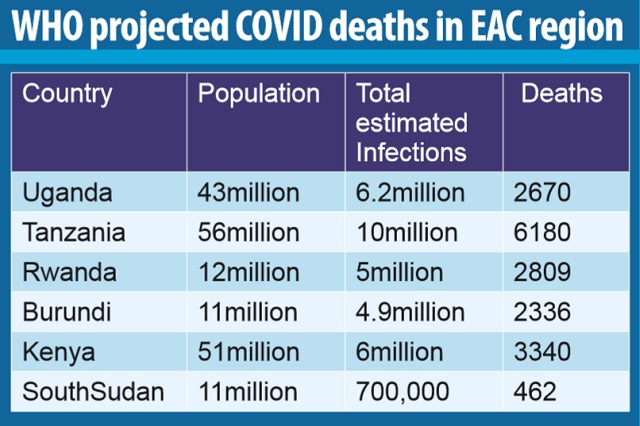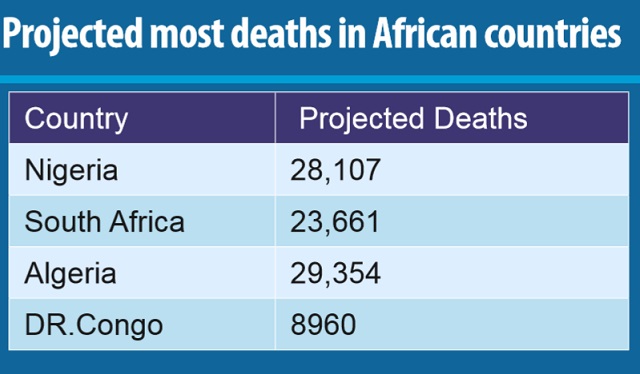

Impact elsewhere
But the WHO researchers also warn that COVID-19 might have an indirect major impact elsewhere; on the economy and the government’s capacity to offer social services in health.
According to them, up to 6.2 million Ugandans could potentially get infected with COVID-19 over the course of a year.
Up to 5 million of these would be nonsymptomatic, but about 120,000 would require hospitalisation. Up to 490,000 would have mild symptoms, and another 490,000 would have moderate symptoms. However, 2700 would have severe symptoms, 1500 would be critical, and 2670 could potentially die.
There will be fewer deaths in Uganda than in China, Europe, or America but relatively younger people will die and those previously considered healthy, due to undiagnosed non-communicable diseases.
“We already see this picture emerging based on the characteristics of persons affected in the African Region compared with other regions,” the scientists say.
This is attributable to a younger population, high access and use of interventions targeted at chronic communicable diseases, and similarity in non-communicable disease burden with other affected countries. Other factors are being explored to explain the differential transmission, such as possible crossimmunity with other coronaviruses or BCG vaccine, and population behavioural characteristics.
The researchers say this means COVID-19 will lead to more deaths from other conditions due to changing health seeking behaviours among the population who may perceive health service delivery areas as hotspots of infection. It will all lead to diversion of time, money and other health resources and overwhelmed the health services.
Health systems that have historically focused on provision of a limited primary care and not basic emergency interventions will be hit hard.
“The case fatality rate, particularly when based on deaths among known cases with moderate to critical symptoms, may be high due to weaker mitigation measures, especially pertaining to care of severe and critically ill persons,” the researchers say.
The researchers say: These hospitalisations would be widespread, with some occurring in areas where access to services is poor and inaccessible to the most disadvantaged. The creation of special COVID-19 service areas to reduce nosocomial infections would be difficult to establish and sustain. Facilities would need to be effectively prepared with diagnostic and functional triage systems, many of which are currently ineffective”.
They say many death may go unreported due to low coverage of service provision units and death reporting, coupled with diagnostic challenges.
“These system capacity challenges highlight the need to ensure the success of the containment measures to avoid the need for mitigation measures that, despite the relatively fewer cases expected in the region, will be difficult to institute,” they say.
The containment measures recommended are exactly what Ugandans have implemented before but are now ditching.
They include the 10 Non-Pharmaceutical Interventions (NPIs) the WHO considers, including seven distancing ones (closure of schools, formal workplaces, markets and social entertainment places, together with restrictions on intercity travel, social gatherings such as burials and public transportation) and three hygiene practices (enforcement of regular handwashing and safe hygiene practices).
The more the NPIs and higher their implementation, the greater the effect of reducing he country’s attack rate from COVID-19. They also include the distribution factor based on how quickly an infected person can move from one place to another. It is easier to move where there are motor vehicles and good roads.
 The Independent Uganda: You get the Truth we Pay the Price
The Independent Uganda: You get the Truth we Pay the Price




Government what are you still waiting from stopping track drivers or you first want them to caused more problems to Ugandans that when the President and his ministers will open their eyes
There are some schools that are day sectioned . When the candidates of such schools are allowed schooling in this period, they will interact with their friends at school and with people at home when they are back fron schools escalating prevalence rate.
My suggestion is why can’t the president open up the economy allow the schools to open up and concentrate on the boarder points both manned and porous so that no body is allowed to proceed into the country before getting his results. Because the continued lockdown of the economy may result into an economic disaster which may be hard to come out, I see it very expensive to test a driver allow him to proceed get contacts you start tracing him with his contacts you get him with his 30 contacts quarantine them for the first 14 days, why not to keep one person at the boarder for maximum of 24 hrs before he comes to the public.
Let the president of uganda continue with the measures that has been in place